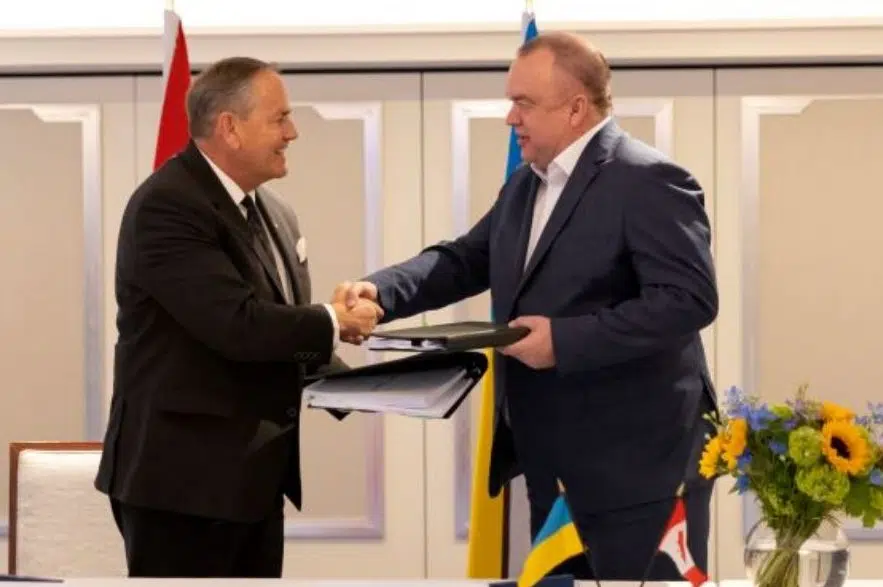Saskatchewan uranium is about to become the source keeping lights on in Ukraine.
Cameco president and CEO Tim Gitzel spent last weekend in London to meet with representatives of Ukraine’s state energy producer, Energoatom, to sign the papers of the multi-billion-dollar deal announced by Cameco at the beginning of February.
It was Gitzel’s first time meeting in person with Energoatom president Petro Kotin — the first chance Gitzel said Kotin had had to leave Ukraine for a few days.
“It’s a big deal,” Gitzel told Gormley guest host Taylor MacPherson on Tuesday.
Gitzel traced the working relationship between Cameco and Ukraine back to before the war, beginning in 2018-19. Gitzel explained Ukraine was contemplating diversifying its fuel supply at the time, but hadn’t made any big moves yet and was still exclusively dependent on Russia.
At the outset of war, Gitzel said Energoatom approached Cameco about fuel supply, which Cameco was happy to oblige. The organizations worked together over 2022 and announced the agreement in early 2023, though papers still needed to be signed.
The deal will see Cameco supplying all of Ukraine’s 15 nuclear reactors, depending what is under Ukrainian control as the war continues. Cameco will supply uranium from Saskatchewan to the amount of 40 million to 70 million pounds over the 12-year contract.
Cameoco will serve as the sole provider of uranium and conversion services for Ukraine during that time.
“(It was) super-important for Cameco to be there from a commercial point of view, yes, but a moral view as well,” Gitzel said. “We stand with the Ukrainians.”
Further, Gitzel told MacPherson that Energoatom is “delighted” to be working with Saskatchewan and Cameco moving forward.
Gitzel said he’s hopeful all uranium being supplied to Ukraine will be mined in Saskatchewan and Cameco has stepped up its production operations. Previously, Gitzel said the company had planned to pull back operations at its Cigar Lake mine in northern Saskatchewan, which produces about 18 million pounds of uranium each year.
“We’re not now, I can tell you that,” he said. “We need all of that.”
The company is also reopening its McArthur River/Key Lake facilities that have been shut down for the past five years. Those operations will run at a reduced rate, though Cameco is working to ramp up production again as fast as possible, Gitzel explained.
Between those two facilities, Gitzel said the amount needed for the contract will be produced.
The mined materials are sent for refinery and conversion to Ontario — another 12-year contract, according to the CEO. The gas will then be sent to an enrichment facility in Europe and fabricated into fuel bundles, done by Westinghouse, which is owned by Cameco and Brookfield Renewable.
The energy supply will be supplied to Ukraine right away, Gitzel said, explaining that nuclear energy is about 50 to 60 per cent of the country’s electricity.
“They say they count on it every day,” Gitzel said.
While blackouts are still happening in the country, Gitzel is hoping the agreement will see the lights turned back on in Ukraine, thanks to Saskatchewan.
Some risk is involved with the war ongoing, but Gitzel noted most of that as it pertains to this deal is on the side of Energoatom. After having dinner with Kotin in London, Gitzel said it was fascinating to learn more about the utility president’s life in Kyiv.
Kotin’s family has four children, Gitzel relayed. Each night, they wait to hear the air-raid sirens go off before seeking shelter in the basement.
Gitzel said there’s also a risk that some of Ukraine’s nuclear reactors aren’t able to be powered while not under Ukrainian control due to the war. He said that won’t be an issue, and uranium that isn’t needed by Ukraine can be sold to other companies — thanks to other big customers embarking in the race to net zero.
The push towards electrification and decarbonization has fuelled that, Gitzel shared, as countries assess their options and decide to move away from more traditional energy sources of coal, oil and gas.











